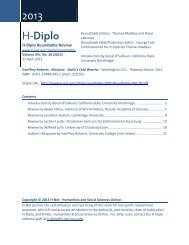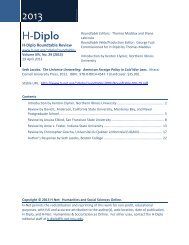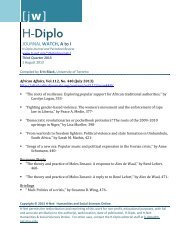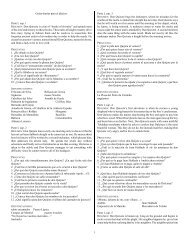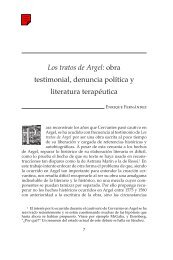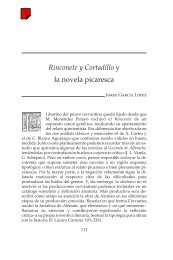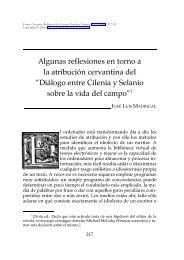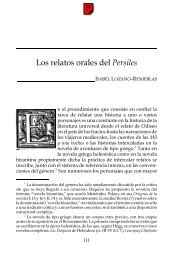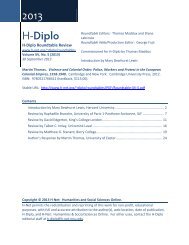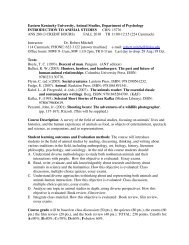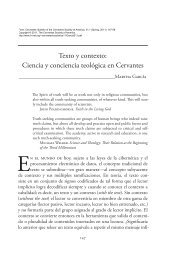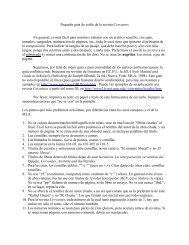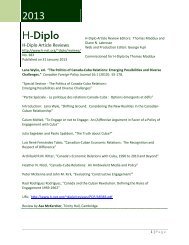The Function of Skepticism in Part I of Don Quijote - H-Net
The Function of Skepticism in Part I of Don Quijote - H-Net
The Function of Skepticism in Part I of Don Quijote - H-Net
Create successful ePaper yourself
Turn your PDF publications into a flip-book with our unique Google optimized e-Paper software.
Volume 30.2 (2010) <strong>The</strong> <strong>Function</strong> <strong>of</strong> <strong>Skepticism</strong><br />
129<br />
ra! Y si todavía, llevado de su natural <strong>in</strong>cl<strong>in</strong>ación, quisiere leer libros<br />
de hazañas y de caballerías, lea en la Sacra Escritura el de los Jueces [y<br />
otros libros verdaderos]; que allí hallará verdades grandiosas y hechos<br />
tan verdaderos como valientes, cuya lección de sus valerosos hechos<br />
puede entretener, enseñar, deleitar y admirar a los más altos <strong>in</strong>genios<br />
que los leyeren. Ésta sí será lectura digna del buen entendimiento de<br />
vuestra merced, señor don <strong>Quijote</strong> mío, de la cual saldrá erudito en<br />
la historia, enamorado de la virtud, enseñado en la bondad, mejorado<br />
en las costumbres, valiente s<strong>in</strong> temeridad, osado s<strong>in</strong> cobardía, y todo<br />
esto, para honra de Dios, provecho suyo y fama de la Mancha, do,<br />
según he sabido, trae vuestra merced su pr<strong>in</strong>cipio y origen. (49, 516)<br />
<strong>The</strong> Canόnigo’s explanation is consistent with the most important tenet<br />
<strong>of</strong> the skeptical tradition: it is impossible to obta<strong>in</strong> a happy life when<br />
the soul is under the <strong>in</strong>fluence <strong>of</strong> false beliefs. To put it simply, <strong>Don</strong><br />
<strong>Quijote</strong> and the readers <strong>of</strong> the Romances <strong>of</strong> Chivalry are be<strong>in</strong>g harmed<br />
because the books they read are false. <strong>The</strong> connection between <strong>Part</strong> I and<br />
skepticism is deliberate because the harm <strong>of</strong> those books is presented as<br />
be<strong>in</strong>g <strong>in</strong> direct proportion to the level <strong>of</strong> dogmatism <strong>of</strong> the person read<strong>in</strong>g<br />
them: as we shall see below by way <strong>of</strong> example, the more dogmatic one<br />
is, the more harmful they become. <strong>The</strong> explicit goal <strong>of</strong> <strong>Part</strong> I is therefore<br />
consistent with the skeptical tradition <strong>of</strong> avoid<strong>in</strong>g the harm caused by<br />
falsehoods, and therefore, if we take that purpose seriously, then the connection<br />
with skepticism is double. Not only did Cervantes write a story<br />
that relies on skeptical structural elements, but also the aim <strong>of</strong> that story<br />
is consistent with skeptical doctr<strong>in</strong>e.<br />
<strong>Skepticism</strong>, the Ventero and <strong>Don</strong> <strong>Quijote</strong><br />
<strong>The</strong> arguments advanced by the Ventero and <strong>Don</strong> <strong>Quijote</strong> can be used as a<br />
summary and further illustration <strong>of</strong> the skeptical elements <strong>in</strong> the story <strong>of</strong><br />
<strong>Don</strong> <strong>Quijote</strong>. <strong>The</strong> Ventero appeals to authority as follows:<br />
Bueno es que quiera darme vuestra merced a entender que todo aquello<br />
que estos buenos libros dicen sea disparates y mentiras, estando<br />
impresos con licencia de los señores del Consejo Real como si ellos



